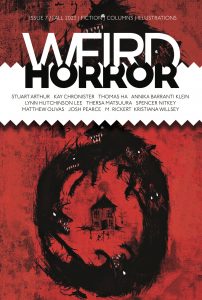Paula Guran Reviews Weird Horror, Lady Churchill’s Rosebud Wristlet Summer, and Uncanny
 Weird Horror Fall ’23
Weird Horror Fall ’23
Lady Churchill’s Rosebud Wristlet Summer ’23
Uncanny 9-10/23
With its seventh issue, Weird Horror (Fall 2023) has finally hit its stride. All 11 stories are effective, and several are laudable. Stuart Arthur’s “Devil’s Acre” builds the creep well with the tale of a cruel father who intentionally places his eldest child in supernatural jeopardy. The narrator of “Cretins” by Thomas Ha suffers from an incurable disease that is so fatiguing he must find public places in which to rest. Beset by an unknown stalker while unconscious, the vulnerable narrator seeks to discover more about them. His knowledge results in actions neither the stalker nor the reader expect. Matthew Olivas devises a multilayered story with his “The Prince of Oakland” – the survival of a city and its people through supernatural means, the history of that city, familial and couple relationships, and more – that does not completely succeed for me on all levels, but its originality and sincerity go a long way toward what I imagine his goals to be here. Similarly, Kay Chronister’s “Sotto Voce” is not perfect, but its gothic exploration of two young girls – one unremarkable and one from a uniquely weird family – still entices. “A Geography of Innocence” by M. Rickert is, however, 100%. Short and elegantly written, its narrator looks back 30 years to her childhood when a neighbor girl disappeared from their small town. Rickert’s exploration of “the map of innocence” and “what marks the border of guilt” is a dark gem.
Lady Churchill’s Rosebud Wristlet #47 is also outstanding. The only things its eight pieces of fiction have in common are that each is well-executed and uniquely quirky. Three resonated more than the others with me. “Radoret” by Serafina Bersonsage is a dark fairy tale about a people who, for various reasons, occasionally kidnap children they then raise as their own. At the end, you realize it’s an updatingof an old, highly recognizable tale. Callum Angus’s “Red Work” is a coming-of-age story that offers a profound sense of place – the high desert of Oregon – and vivid characterization with his portrayal of a young woman finding herself amongst a bunch of daredevil women who skate in a basalt volcanic crater every full moon. Although I don’t feel the ending quite lives up to the of the rest of the story, it’s still a good read. “Black Girl Liminal” by Maya Beck is superbly psychedelic, which is as it should be since its protagonist, Miriam, encounters a rabbit god (“the patron saint of lost black girls, extra black girls who embrace liminality to fight this planet’s Rot”) who offers her certain powers. At a cost, of course.
All eight stories in Uncanny #54 are worth reading, but three are outstanding. The issue leads off with the amazing “Can You Hear Me Now?” by Catherynne M. Valente. The narrator was born of, and lives in, commercials. Valente takes on the history of media advertisements and issues of identity, capitalism, and more in fabulously written, witty, sarcastic, prose. Insightful, angry, funny, and so whip-smart and compelling it made me want to watch commercials. An absolute must-read. Novella “The Kingdom of Darkness” by Sarah Monette is, according to its author, “based on the Salem witchcraft crisis of 1692.” The tale, set in an alternate universe where demons are real, is a fascinating murder mystery. When teenaged Olga visits the tunnel under the Devil’s bridge in novelette “Six Versions of My Brother Found Under the Bridge” by Eugenia Triantafyllou, she finds something/someone she did not expect and brings it/him back to her troubled home. Triantafyllou deals with a family that needs mending, altered by the loss of a child. Beautifully written, this one packs an indelible emotional impact.
Recommended Stories:
“Black Girl Liminal”, Maya Beck (Lady Churchill’s Rosebud Wristlet Summer ’23)
“Cretins”, Thomas Ha (Weird Horror Fall ’23)
“The Kingdom of Darkness”, Sarah Monette (Uncanny 9-10/23)
“A Geography of Innocence”, M. Rickert (Weird Horror Fall ’23)
“Six Versions of My Brother Found Under the Bridge”, Eugenia Triantafyllou (Uncanny 9-10/23)
“Can You Hear Me Now?”, Catherynne M. Valente (Uncanny 9-10/23)
Paula Guran has edited more than 40 science fiction, fantasy, and horror anthologies and more than 50 novels and collections featuring the same. She’s reviewed and written articles for dozens of publications. She lives in Akron OH, near enough to her grandchildren to frequently be indulgent.
This review and more like it in the December and January 2023 issue of Locus.
 While you are here, please take a moment to support Locus with a one-time or recurring donation. We rely on reader donations to keep the magazine and site going, and would like to keep the site paywall free, but WE NEED YOUR FINANCIAL SUPPORT to continue quality coverage of the science fiction and fantasy field.
While you are here, please take a moment to support Locus with a one-time or recurring donation. We rely on reader donations to keep the magazine and site going, and would like to keep the site paywall free, but WE NEED YOUR FINANCIAL SUPPORT to continue quality coverage of the science fiction and fantasy field.
©Locus Magazine. Copyrighted material may not be republished without permission of LSFF.





